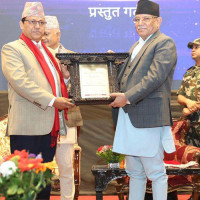- Friday, 3 May 2024
‘EC working to secure voting rights for Nepalis living abroad’
(CEC) Dinesh Kumar Thapaliya has said that efforts are being made through diplomatic channels with relevant countries to secure voting rights for Nepali citizens living abroad. The Rising Nepal’s Indira Aryal had a conservation with Thapaliya on the electoral system of the country and other issues. Excerpts:
After the promulgation of the Constitution of Nepal, elections at all three levels have been conducted twice. What achievements have been made so far? How satisfied is the commission with its role and the electoral outcome?
Thapaliya: The establishment of a federal democratic republican system has been crucial in the implementation of the federal republic. The government at all three levels, empowered by the sovereign people, is now represented by around 42,000 elected representatives. There is a growing belief that elections can be conducted in a clean, free, impartial, and cost-effective manner.
The involvement and cooperation of the communication circle, political parties, voters, and all stakeholders have initiated a chain of collaboration and cooperation in election management expenditures. It has been proven that efficiency can be achieved in election management expenses. Based on past experiences, efforts have been made to control and manage elections, which have become more transparent and cost-effective.
While satisfaction is in question, based on the experience of two successive periodic elections and the experiences gained from National Assembly members election and by-elections, it is necessary to move forward amending the election laws, addressing the subject matter, and harmonising all structures of the commission up to the district level to expand coordination to all local levels and minimise discrepancies. Actions such as extending support and overcoming setbacks have made the commission more serious. Despite the lack of resources, progress in improvement has not been achieved at the desired pace. It is necessary to focus on technological advancement, election education, capacity building, structural improvements, and other related areas before the election. Extensive improvements and a positive outlook are necessary in the areas of development, election education, capacity building, and structural improvement, among others, during the pre-election period.
Would you like to elucidate further on this?
Thapaliya: In principle, the commission is an independent, autonomous, and empowered constitutional body in the context of election management. However, in practice, there are many challenges. Some provisions related to elections under election laws and certain provisions of the Constitution of Nepal Amendment Act, as well as the Political Parties Act 2073, particularly section 32(2) regarding the division of political parties, were amended. The commission was unaware of this. When there is no consultation in Parliament, and immediate action is necessary, it should come on the recommendation of the Council of Ministers. Matters such as party division, which are related to internal party affairs, become difficult for the government to handle, and it becomes necessary to act promptly. The amendment was repealed, but the original provision was not reinstated. Since then, for the past two and a half years, it has been inactive. How will the commission be accountable and manage responsibility in this regard? If the law made by the Parliament is to be implemented by the government, how can legislative supremacy be maintained in lawmaking?
Why does the Election Commission need authority to announce election dates?
Thapaliya: The subject of announcing election dates always becomes controversial. Voters are sovereign. The Universal Declaration of Human Rights of 1948, our Constitution, and the Election Act all establish the secrecy of elections and the system where voters independently vote for their chosen candidates. The exercise of this right to choose and be chosen is crucial. During the recent national assembly elections, it was observed that voters had crossed the floor, and voted across parties, which led to the creation of misleading statements and information through expressions and news. The practice of using the term "floor-crossing" in the context of elections and parliamentary practices has been sought to be used in a single meaning. Exploring how to use floor-crossing in the context of secret balloting in elections and parliamentary practices raises questions about how voter confidentiality is maintained. On this subject, through the media, I am making a special request to advocate for the universal rights of voters.
What initiatives have been taken to improve gender representation in the upcoming elections?
Thapaliya: This is the main topic. We have presented a draft of an integrated election law amendment to the Government of Nepal, which addresses all these issues. This proposal includes the Election Management Bill. We believe that within a year, the bill will be passed, and preparations for the upcoming elections can be conducted by the same law. In addition to this, by using existing laws, we are working on decentralising voter registration and updating the voter list through local authorities, registering overseas Nepali voters through diplomatic missions, conducting election education through local authorities, and improving the voter list through an electoral system. We are advancing these tasks.
Let's change the topic. The participation of voters in elections has decreased, and the invalid votes remain the same. Is it not the responsibility of the commission to address these?
Thapaliya: Certainly, it is. We are serious about this. We are actively seeking solutions and strategies. However, it is not solely the fault of the commission. There are many seen and unseen reasons behind it. The first thing we noticed after the promulgation of Nepal's constitution was the unique perspective of political parties towards the system we relied on. Due to the mentality of winning elections and joining the government, some leaders, activists, and members of certain parties directed their decision-making towards nominating candidates and issuing directives to vote for a specific party symbol rather than allowing their principled activists to nominate candidates and issue directives to vote for a particular party symbol. This undermined the democratic system based on multi-party competition established by Nepal's constitution. The use of individuals rather than party ideology, principles, and programmes in elections under a multi-party system has weakened the sentiment and enthusiasm of ordinary voters.
Secondly, with about 4 million citizens studying, working, doing business, or seeking foreign employment abroad, there is a lack of legal provisions to facilitate their voting rights while residing overseas. On the other hand, political parties and candidates have not been able to attract and motivate them to return to the country to cast their votes during elections. Even local voters who remain within the country are not enthusiastic about going to their local polling centres to vote. The legal framework for voting from where they are currently located has become legally complex. We expect that future laws will seek appropriate solutions to this issue. We have proposed solutions to address this burning issue.
Thirdly, the Election Commission's policy of deploying voter education through local authorities to reach every household has not been successful. Fourthly, despite the complexity of ballot papers and the honorable Supreme Court's orders, due to the lack of legal provisions, the provision for NO VOTE (None Of The Above) could not be implemented, leading to an increase in invalid votes. Fifthly, voter turnout in parliamentary and provincial elections is about ten per cent lower than in local elections. Although a comprehensive study has not been conducted on this matter, from observations, it seems that while MPs are responsible for legislation, policy-making, and lawmaking, their focus often diverges to individual projects like roads, water supply, bridges, irrigation, employment, agriculture, development, tourism promotion, etc., rather than fulfilling their core responsibilities. This diversion has led to a decrease in voter attraction and thus participation. Therefore, the real responsibility of lawmakers needs to be clarified, not only through voter education but also by ensuring similar conduct from candidates.
Some candidates themselves claim that our electoral system is expensive and only those with money, not honest individuals, can afford to run for elections. How has the Election Commission confronted this issue?
Thapaliya: This question has been raised repeatedly, even in parliamentary committees. To find the answer to this, we need to explore some questions. For example, in a multi-party competitive democratic system, does a person vote for the ideology, principles, and programmes of a party, or for the charisma and status of an individual? Is it really expensive to promote a party's ideology, principles, programmes, and election symbols? Is the vote of an empowered voter truly a commodity that can be bought and sold? Should party officials, members, and activists receive additional benefits when they engage in election-related activities?
The Election Commission has rightly pointed out that the expenditure limit set for campaigning under the Election Code of Conduct is insufficient. What should be the standard for determining whether an election system is cheap or expensive? Can the system punish actions contrary to election laws, codes of conduct, and unethical practices, regardless of whether they are committed by candidates or parties? Through analyzing such questions, the Commission has clearly stated that it is not about the position, money, influence, or temptation, but about winning through thought, principles, integrity, and honesty. The Commission has stated that all candidates within the prescribed limit should disclose their expenses and present accurate details, and it is not the ethical right of any candidate to claim that the election has become expensive.
Political parties should reach a consensus to determine how to improve our system. Individuals who defy the system and laws they themselves have created cannot be expected to uphold governance and prosperity. Despite these challenges, the Commission is seeking appropriate addressing of potential problems in the proposed law. Efforts are being made to amend political party-related laws to further regulate them. We are not only concerned about this issue but also sensitive to it.
You have raised the issue of voting rights for Nepalis living abroad. When will their voting rights be ensured?
Thapaliya: The current election laws do not grant the right to vote from abroad to Nepalis living overseas. However, in the proposed Election Management Bill, fundamental voting rights are expected to be granted to those who can register as voters, allowing them to vote in Nepal or participate in advance voting. The possibility of online voting is also being considered after studying its security and feasibility.
Efforts are being made through diplomatic initiatives with relevant countries to secure voting rights for Nepali citizens living abroad. While the concept may seem simple, its implementation is not as straightforward. Once the new laws are specified, procedures for registering voters' lists for Nepali residing abroad will be approved, and preparations are underway under the coordination of the Ministry of Foreign Affairs of the Government of Nepal to begin voter registration processes in coordination with some countries.
Nepal has also initiated discussions on the electoral system it has adopted. What steps has the Commission taken in this regard?
Thapaliya: Primarily, the Election Commission is the constitutional body mandated to manage elections under the rights provided by the Constitution and laws according to the electoral system adopted by the country. However, the laws related to political parties also assign the responsibility to the Commission to conduct discussions and research on the electoral system. Accordingly, the Commission has conducted an extensive study on the subject of the electoral system through policy research institutions. Although the study report has not been received yet, discussions and presentations primarily focus on the following topics related to the electoral system.















